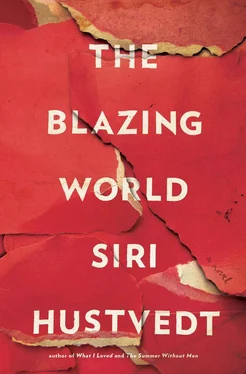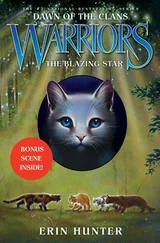At some point we stepped outside and sat on the steps and talked more. He cupped his hands to light a cigarette and smoked. He jittered his knee as he inhaled and exhaled. The wind blew. I had no intention of taking our flirtation anywhere, but it was enjoyable nevertheless. He liked me in navy blue. He approved. I was flattered, a tad nervous, and therefore loquacious. Anxiety makes me talk more, not less. Rune examined my palm and invented a comical future for me with four husbands and many adventures and a very long life, and when he held my hand, he traced the lines with his index finger. He went on to say he read noses, too, and touched mine. And then he brought up Father. He wanted to know what it had been like to be a child in my household, to have all those paintings around, to watch the “gods” come and go.
I told him kids don’t think about that — whatever is just is. He told me he had known Father “a little” back in the day, when he was first in New York. “You have his eyes.” I do have my father’s eyes, and somehow hearing this made me suddenly sorry for myself. I felt that I was looking at me from the outside. Poor thing, she’s tired, I thought. And then I realized I had been tired for years. I was trying to make a film. Aven was six, a demanding oddball of a kid, who took everything too hard. Oscar was feeling neglected by me. My mother was lost in her own world of metamorphs, phenomenology, and pseudonyms, and my dear father, who surely would have helped make the whole situation better, was dead. An involuntary sob escaped me.
“You worshiped your father, didn’t you?” Rune looked me straight in the eyes. I told him worship was not the right word, but it wasn’t the word as much as his intonation that made me feel awkward. He smiled. “I always had the feeling that Felix was a man who knew what he wanted.” I don’t know why, but I felt slightly alarmed. Then he added, “He had a great eye.” This meant nothing. It was what everyone said, but I felt vaguely distressed. I was wearing a scarf, and Rune picked up the end of it and began to play with the fringe. He had a souvenir, he said, from those days that he carried with him. He reached into his pocket and took out a key. He held it out to me in the palm of his hand.
I remember looking down at it, confused. I asked him what it was for. He said it was the key to a place that no longer existed. I asked him what it had to do with Father, and he said, “Don’t you know, Maisie?” I didn’t know, and I was annoyed. I stood up to leave, but he still had a grip on my scarf, and as I pulled away from him, it tightened around my neck. I demanded he let go, but he tugged me down toward him so my face was only inches from his, and he smiled broadly. I pushed him away, and he lifted his hands in the air, a surprised look on his face, as if it had all been an innocent joke. He accused me of being “touchy.” He was only “teasing” me. But I was shaken, and he knew it. How I wished later that I had been able to hide my dread, laugh at him, make some cutting remark, but I couldn’t.
I have never mentioned this to anyone. I’m telling it now for the first time, and I’ve wrestled with the fact that something so small could have felt so large. What had happened, after all? He had shown me a key that could have been any old key to any old door, and then he had implied that I should know about it. He had grabbed my scarf to prevent me from leaving. At the same time, he had charmed me, and I had felt attracted to him, more attracted than I had felt to a man in years. I had let him touch me, let him fiddle with my scarf. I had giggled at his jokes and had yattered on about my project. The instant he mentioned my father, however, the conversation had been twisted into another shape. Suddenly, it had turned rife with innuendo, as if this man had shared a story with Father, and the mood had changed. No, my mood had changed. He had remained unruffled. But I had felt humiliated, as if all that had gone before had been a prelude to a subtle moment of cruelty, a play on my doubts, doubts he seemed to know I had, doubts I could not talk about, not only because they frightened me but because I did not know what they were. I didn’t know what I was afraid of.
I can’t really say what went on between us. Whatever it was seemed to be as much about my father and mother as it was about me. We are always concocting theories about how the world works and why people act in the ways they do. We invent motives for them, as if it’s possible for us to know, but more often than not these explanations are like flimsy cardboard stage sets we put up in front of reality because they are simpler and less distracting than what’s actually there. I think I became a documentary filmmaker to try to get a truer view. It’s not that film can’t lie or distort or be used for dastardly purposes, it’s that sometimes the camera extracts from the faces and bodies of its subjects what they do not say aloud. I was sixteen when I first saw Marcel Ophüls’s The Sorrow and the Pity , and after that, I couldn’t stop thinking about the expressiveness of people’s hands when they are controlling their faces. I have often wondered what I might have seen in Rune if I had had a camera. Maybe nothing. After all, he was an expert at filming himself.
That night, as I lay in bed next to a snoring Oscar, I remembered Rune saying “Don’t you know, Maisie?” It had felt like an accusation. Did I know something? And then I remembered my father’s keys, the strange keys he had scooped up that morning when I was just a girl. I remembered standing in Green-Wood Cemetery and the glamorous white angel on a gravestone near Father’s plain one, and then I remembered visiting my mother a few months after Father died. I was there often, and the doorman let me up without phoning. When I rang the bell in the hall, Mother didn’t come to the door, even though she had to know it was me. The door was open, so I went in, and I heard the sound of retching from the guest bathroom in the hall off the dining room. I ran toward the sound and found my mother hunched over, her arms folded across her chest. Vomit shot from her mouth like a missile, not into the toilet but onto the seat and floor. There were tears in her eyes, and I took her arm. She said, “No, no, it’s okay. Leave me.” But another wave struck, and I was shocked to see the force of the heaving that convulsed her body. I grabbed her around the waist and held her forehead close to the toilet bowl. As a child when I threw up, Mother always held my forehead for comfort. “I can’t keep it down, Maisie.” She was gasping. “There’s something wrong with me. I can’t keep it down. I’m sorry. I’m so sorry.”
I cleaned her mouth with a washcloth and walked her to the other end of the apartment and settled her into bed. She lay down. Then I left her and returned to the bathroom and cleaned the vomit with a big roll of paper towels, which one after another I discarded in a garbage bag. I remember the pungent smell that made me hold my breath, the yellow liquid slime with small brightly colored bits of food in it. I remember that I spilled some bleach, too, which left white spots on my jeans. I worked hard to make sure that no trace was left on the floor or walls or behind the toilet bowl. When I moved quietly down the hallway toward the bedroom, I heard the noise of Mother crying. She didn’t cry, at least not in front of me. She hadn’t cried at Father’s funeral or at Grandmother’s or Grandfather’s. Her sobs were strange, somehow inhuman. She sounded like a dog that makes strangled yelps and yowls when it tries to talk, and then came a long, hoarse shriek that made me stop short in the hall, an extended howl of agony. I felt my face contort as I leaned against the wall outside my parents’ bedroom, listening to my mother. I wanted to go to her, but I was afraid to look at her, afraid of her feeling. I waited. I waited for the worst to end. By the time I went in to her, she was calm. Again she apologized. I told her there was nothing to be sorry for.
Читать дальше












